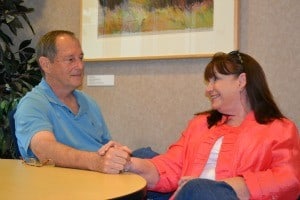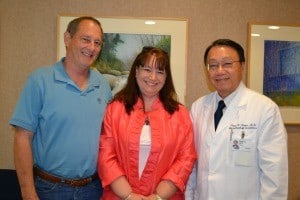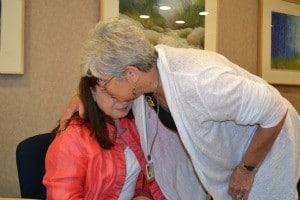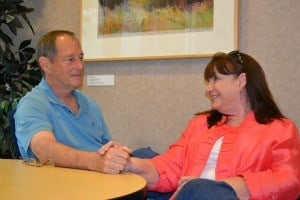‘Lewy’s Here’: Popular Coach Shares Journey with Lewy Body Dementia
| With his wife, Jennifer, by his side, the 62-year-old says he’s confident he’s got the best team of professionals with the Donald W. Reynolds Institute on Aging at UAMS as he faces a life that’s slipping away.Tom Webb knows a lot about building confidence, teaching strategy and working toward a goal as a team.

Tom Webb, diagnosed with Lewy body dementia, holds his wife Jennifer’s hand.
“I was doing my reports on these intervention kids and I just went blank,” said Tom, about his duties as a math teacher. “I knew I was having trouble when I was doing quadratics. Everything turned into Chinese. I’ve always been self sufficient, but I just broke down physically.”
At one point, the principal of his school found him sitting in his car, staring off in space, in the school parking lot.
Lewy body dementia is an Alzheimer’s-related condition characterized by confusion, memory loss, reduced attention span and hallucinations.
Jennifer Webb says the first red flag for her were small, in her words, “annoyances,” that she first attributed to his “very unusual personality.” He would ask about the time of day and seconds later: “Did you tell me what time it is?”
When the couple had tickets for the ballet, Jennifer realized Tom’s confusion was more than “smart-headedness” about not wanting to go out. He couldn’t grasp the multiple steps needed to walk out the door.
“He was actually struggling,” she recalled. “I looked at his face and it was ‘help me…I need some help. I really don’t know what’s happening.’”

Tom and Jennifer Webb meet with Pham H. Liem, the geriatrician who diagnosed Webb’s Lewy body dementia
The Webbs sought medical help. The first doctor they saw diagnosed a vitamin deficiency. “It worked for a little while,” said Jennifer, “but it didn’t get better.” The second doctor the Webbs visited confirmed Jennifer’s suspicion that something was terribly wrong, and referred Tom to Pham H. Liem, M.D., a geriatrician in the Donald W. Reynolds Department of Geriatrics.
“In the case of Mr. Webb, finding the correct diagnosis was not that simple,” said Liem. “My first impression was he was relatively young to have this condition. He had no significant family history. I thought perhaps we’re dealing with a metabolic reason for his symptoms.”
Tom underwent a full psychological check-up, a battery of tests and a brain scan that proved, as Liem said, “unimpressive.”
Tom’s team at the UAMS Institute on Aging also included Sandra Sanders, a licensed clinical social worker.
“Partnering with the family from the very first visit on is very important to us,” said Sanders. She offered ongoing support for the family, counseling and crisis management. “It was not unusual for Mrs. Webb to call me on a very regular basis to see where we were in the process.”

Jennifer Webb gets a hug from Sandra Sanders, a licensed clinical social worker, who continues to offer the Webbs emotional support.
Sanders proved invaluable in the diagnostic process. She helped secure evidence-based scholarly journal articles that supported the need for a metabolic brain scan. The Webbs’ health insurance company didn’t want to cover the procedure because Webb did not fit the typical profile for Alzheimer’s.
“If it had not been the good people here at UAMS, I don’t know what we would have done,” Jennifer Webb said. “It’s not an easy process. It’s not like you walk in and they say you have ‘this’ because of clear-cut symptoms because in Tom’s case it wasn’t that way at all. I believe it took four times for us to apply for this one definitive test, that yes, he has Lewy body disease.”
Liem says the results were “very abnormal.”
After hearing the diagnosis, Tom Webb began reading as much as he could about Lewy body dementia. “We are both educated so we knew we had to get in some kind of program that would benefit both of us. Obviously, with this disease, I’m going to need a lot of help in the very last stages and Jennifer needs to know all that. So, we had to learn a lot.”
Tom does better earlier in the day, and the couple is revisiting places in Arkansas they enjoy. He’s adopted language from a book about the brain disorder to communicate with Jennifer; “Lewy’s here” lets her know he’s not functioning well.
Jennifer is learning to cope with her husband’s hallucinations, a hallmark of Lewy body disease. Webb says he’s never been frightened or scared by them. “They’re friendly,” said Webb.
These psychotic symptoms could have been aggravated had Webb been given anti-psychotic drugs, said Liem. Lewy body dementia patients actually have a sensitivity to these medications. “Mr. Webb could have been facing an early death by aggravating his condition,” Liem said.
“The UAMS team has really taken care of us,” Webb said. He says he believes in “being honest and telling the truth” and praises Liem for being frank about his condition. “Dr. Liem’s been fantastic,” said Webb. “He’s cool and he’s honest.”
When asked what gives him pleasure, Webb recalls the days coaching the state championship-winning girls’ basketball team at Bryant High School. Some of his former players still keep in touch. “One player I dearly loved is now head coach of women’s basketball at the University of Texas,” Webb said. “That’s Karen Sue!”
The admiration is mutual. Coach Karen Aston credits Tom Webb with teaching her the meaning of commitment, hard work and goal setting.
“When I consider the journey I have been on in my career, I have to reflect on a period of my life that inspired me as a person. That time was during my playing days with Coach Webb. He pushed his players to heights we could not imagine and all the while he taught us lessons for life. As I embarked on my coaching career, my decision making has always been influenced by his teachings. Not only was he a brilliant X-and-O coach, but he taught me the progression of how to achieve any goal – never to put the ‘cart before the horse’ and the true meaning of diligence. I will forever be indebted to Coach Webb and the wisdom he has passed along.”
